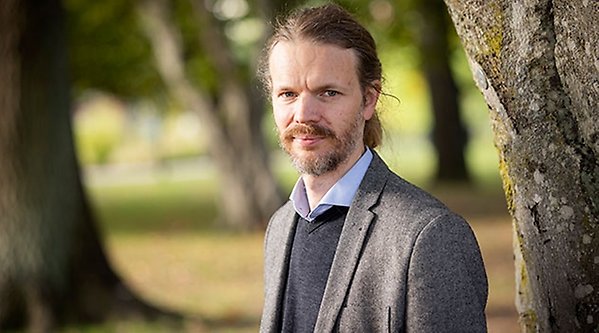David Langlet - "I’m driven by curiosity"

David Langlet´s hope is that scientific and social scientific expertise will be able to be integrated into legal regulations and thus able to support sustainability measures. Photo: Mikael Wallerstedt
How can legislation be connected to climate targets? David Langlet, Professor of Environmental Law at Uppsala University, examines the dynamics between society's values and its legislation.
The world is in the midst of a raging climate crisis that requires decisive action. However, established climate targets and ambitions sometimes clash with national, international and subnational legislation. This is where researchers like David Langlet, Professor of Environmental Law at the Department of Law at Uppsala University, come into the picture.
“Much of my research has been about the dynamics between these spheres. Law always exists in a broader context that has nothing to do with the environment, such as property rights legislation, which can sometimes make it difficult to steer areas such as fishing or forestry in a more environmentally friendly direction. It can also be the case that EU-level procurement rules lead to options being favoured that would preferably not be favoured in a specific case. This means laws that have nothing to do with the environment, but which nevertheless affect the scope for action in that area, thus making environmental law difficult to master,” explains Langlet.
One issue he is working on a lot right now is the need for reform in fisheries management. Currently, says Langlet, the rules for how we fish do not take into account how biomass and species composition in the sea can produce climate benefits, even though the research shows great potential.
“We therefore think that the fisheries management system needs to be reformed and that climate considerations need to be integrated – something we wrote about in a scientific article in Frontiers in Marine Science last spring.”
“Law is a governing instrument that is an extension of politics, and it can be a tool for shifting behaviours and creating incentives for change. But it also has the potential to contribute to both a sustainable and an unsustainable society, depending on what values, morals and thought structures that society has,” he says.
In addition to his own research, Langlet is involved in several other projects. He produces the ‘Miljön och Juridiken’ (Environment and Law) podcast together with Aron Westholm, who holds a doctorate in public law from the University of Gothenburg, and is also involved in CeCar, the Center for Collective Action Research, where interdisciplinary research is conducted into the conditions for large-scale collective collaborations on various societal challenges, such as climate change, the spread of disease and deforestation.
“At the center we examine which aspects promote or discourage collective action on a large scale, and how economics, political science and every imaginable field can be linked to law,” notes Langlet.
He is also one of the figures behind an environmental law conference that was held in September in Stockholm. This is a follow-up of the ‘Stockholm 50+’ environmental conference held in June to boost global environmental and climate cooperation and celebrate the 50th anniversary of the last environmental conference held in Stockholm in 1972. Leading researchers from all over the world have been invited in to speak.
“The 1972 environmental conference is now seen as the starting point for international environmental law as a subject area, and after this year's meeting we wanted to do something of our own from an environmental law perspective. The talks given by the invited researchers was based on this 50-year timespan, that is: where we were then and where we are now, and what we have learned in the meantime from an international environmental law perspective,” adds Langlet.
What drives you in your research?
“I would probably say I am driven by curiosity. What we do is exciting and the exchange of views between us researchers is intellectually stimulating. And we ultimately want to contribute to a good society. When politicians are setting objectives, science can be involved and make a contribution, partly through providing scenarios and partly through an understanding of how the desired change can be achieved in a complex system.”
There are many challenges in his work. Mainly because the environment and sustainability are so complex and multifaceted and touch so many areas of society at the same time – something which, Langlet believes, makes it pointless to talk about it as a single topic. This can often be frustrating, of course, but it is to some extent part of the package.
“The best thing about my job is probably when you sit with a group of researchers from completely different disciplines and perspectives and argue about an issue, because this gives you an insight and your perceptions are challenged and enriched. It's really intellectually stimulating!”
